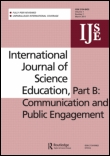
International Journal of Science Education Part B-Communication and Public Engagement
Scope & Guideline
Elevating public engagement through scholarly insights.
Introduction
Aims and Scopes
- Science Communication and Public Engagement:
The journal emphasizes the importance of effective science communication strategies and public engagement practices, particularly in informal settings such as science festivals, museums, and community-based programs. - Educational Methodologies and Practices:
It explores various educational methodologies, including mixed methods, storytelling, and interactive learning, to improve science education and promote scientific literacy among different demographics. - Citizen Science and Community Involvement:
The journal highlights the role of citizen science as a tool for education and community engagement, focusing on how public participation can enhance scientific understanding and foster environmental stewardship. - Innovative Use of Technology in Science Education:
It investigates the integration of modern technologies, such as virtual reality and augmented reality, into science education, aiming to make learning more engaging and accessible. - Socioscientific Issues and Decision Making:
The journal addresses how science education can influence decision-making processes related to socioscientific issues, emphasizing critical thinking and reasoning skills among students.
Trending and Emerging
- Interdisciplinary Approaches to Science Communication:
There is a growing trend towards interdisciplinary studies that combine insights from education, psychology, and sociology to enhance science communication practices. - Inclusivity and Accessibility in Science Education:
The journal increasingly addresses themes of inclusivity, focusing on how science education can be made accessible to diverse populations, including individuals with disabilities and underrepresented groups. - Impact of Social Media on Science Communication:
Recent publications are exploring the role of social media in shaping public perceptions of science, particularly in the context of misinformation and engagement during crises like the COVID-19 pandemic. - Community-Centric Science Engagement:
Emerging themes focus on community-centric approaches to science engagement, emphasizing the importance of local contexts and community needs in science communication efforts. - Emotional and Narrative Dimensions of Science Communication:
There is an increasing focus on the emotional and narrative aspects of science communication, investigating how storytelling and emotional engagement can enhance public understanding of science.
Declining or Waning
- Traditional Science Education Models:
There is a noticeable decline in papers focused solely on traditional science education models without integration of public engagement or innovative practices, as the journal shifts towards more interactive and participatory approaches. - General Science Literacy:
Discussions solely centered on general science literacy are waning, with a shift towards more specific themes that link literacy to public engagement and community involvement. - Focus on Higher Education:
There is a reduction in studies exclusively examining higher education settings, as the journal increasingly emphasizes K-12 education and community engagement contexts. - Static Science Communication Strategies:
Papers discussing static or one-way science communication strategies are becoming less common, as the journal promotes dynamic and interactive forms of communication that foster dialogue and engagement.
Similar Journals
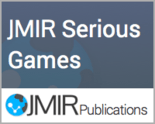
JMIR Serious Games
Innovating Health Solutions with Engaging GameplayJMIR Serious Games is a leading open-access journal published by JMIR PUBLICATIONS, INC, dedicated to disseminating high-quality research in the emerging field of serious games for health. Since its establishment in 2013, the journal has positioned itself at the forefront of innovative strategies using game technology to improve health outcomes, rehabilitation, and mental health treatment. With a commendable impact factor and a prestigious Q1 ranking in Biomedical Engineering, Physical Therapy, and Rehabilitation for 2023, JMIR Serious Games stands out as a crucial resource for professionals and researchers aiming to explore the intersection of gaming and health sciences. The journal fosters a collaborative environment that encourages the sharing of cutting-edge research findings and applications, making it an essential reference for academics, practitioners, and students interested in harnessing the potential of serious games to transform healthcare practices.

Revista Eureka sobre Ensenanza y Divulgacion de las Ciencias
Inspiring Dialogue and Discovery in Science TeachingRevista Eureka sobre Ensenanza y Divulgacion de las Ciencias is a premier open-access journal dedicated to advancing the fields of education and science communication. Published by the University of Cadiz in Spain, this journal has established itself as a vital platform since its inception in 2004. With an ISSN of 1697-011X, it aims to disseminate innovative research and pedagogical strategies that enhance the understanding and teaching of scientific disciplines. As of 2023, it holds a Q3 categorization in Education with a Scopus rank of #989/1543, reflecting its commitment to academic excellence and relevance. The journal's open-access model ensures that valuable research is readily available to educators and researchers worldwide, fostering a community engaged in the promotion of effective science education. With a focus on bridging theoretical and practical applications, Revista Eureka invites contributions that spark dialogue and inspire new methodologies in science teaching and dissemination.

CAPjournal
Fostering Discovery and Outreach in AstronomyCAPjournal, the Communications of the International Astronomical Union, serves as a pivotal open-access platform dedicated to the dissemination of research and innovations in astronomical practices and educational outreach. Published by the esteemed International Astronomical Union, this journal aims to bridge the gap between scientific discovery and public engagement, fostering a deeper understanding of astronomy among both researchers and the broader community. With its open-access policy since 2007, CAPjournal ensures that knowledge is universally accessible, promoting collaborative dialogue and sharing of best practices in the field. Its ISSN numbers, 1996-5621 for print and 1996-563X for electronic formats, signify its dual commitment to traditional and modern publication methods. Positioned at the intersection of science and education, CAPjournal not only publishes original research but also features thought-provoking articles, reviews, and case studies that encourage innovative teaching methodologies and outreach initiatives. For researchers, professionals, and students alike, this journal is an invaluable resource for staying at the forefront of astronomical advances and educational strategies.
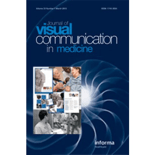
Journal of Visual Communication in Medicine
Transforming Medical Narratives Through Visual InsightThe Journal of Visual Communication in Medicine, published by TAYLOR & FRANCIS LTD, stands as a pivotal platform in the interdisciplinary exploration of visual communication within the medical field. With its origins dating back to 1978 and a convergence set to reach 2024, this journal not only boasts an impressive impact factor but also occupies prominent positions in the Scopus ranking, with Q2 classification in Health Professions and Q1 in Visual Arts and Performing Arts. Situated in the United Kingdom, the journal embraces rigorous peer-reviewed research and innovative practices that bridge art and health communication, thus serving as an essential resource for researchers, healthcare professionals, and students eager to enhance their understanding of visual methodologies. Although it does not currently offer Open Access, its rich content and scholarly contributions deeply influence practices and policies across related disciplines. As a thought leader in its field, the journal encourages the advancement of knowledge and fosters dialogue among professionals committed to improving health communication through visual means.

Tijdschrift voor Communicatiewetenschap
Bridging Theory and Practice in CommunicationTijdschrift voor Communicatiewetenschap is a prominent academic journal published by Amsterdam University Press, specializing in the dynamic field of communication studies. With an ISSN of 1384-6930 and an E-ISSN of 1875-7286, this journal plays a vital role in disseminating high-quality research, theoretical advancements, and practical insights related to communication theory and practice. Despite its Q3 rank in the Communication category, it serves as a crucial platform for scholars and practitioners, striving to bridge gaps in knowledge and promote interdisciplinary dialogue. The journal's impact is reflected in its lineage of contributions from leading authors in the field. While the journal is not openly accessible, its curated content remains invaluable for researchers, professionals, and students eager to stay at the forefront of communication scholarship. With publications spanning from 2008 to 2024, 'Tijdschrift voor Communicatiewetenschap' continues to foster the development of communication sciences from its base in Amsterdam, Netherlands.
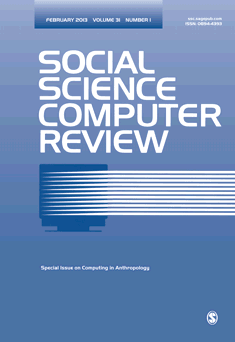
SOCIAL SCIENCE COMPUTER REVIEW
Empowering researchers with rigorous interdisciplinary studies.SOCIAL SCIENCE COMPUTER REVIEW, published by SAGE Publications Inc, is a premier peer-reviewed journal that has been contributing to the intersection of technology and social science since its inception in 1983. With an impressive H-index and categorized in Q1 across multiple disciplines including Computer Science Applications, Law, Library and Information Sciences, and Social Sciences (miscellaneous), this journal stands out as a critical resource for researchers, professionals, and students seeking to explore the implications of computational methods in societal contexts. The journal is widely recognized for its rigorous scholarship, evidenced by its high Scopus ranks in various categories, notably ranking #17 in Social Sciences - Law (98th percentile) and #9 in General Social Sciences (96th percentile), making it an essential publication for those looking to stay at the forefront of social science research. Though it does not provide open access, the journal's commitment to disseminating cutting-edge research ensures its vital role in advancing knowledge and fostering interdisciplinary collaboration. For those engaged in studying and applying computational techniques within the social sciences, SOCIAL SCIENCE COMPUTER REVIEW is a valuable and indispensable source.

CANADIAN JOURNAL OF INFORMATION AND LIBRARY SCIENCE-REVUE CANADIENNE DES SCIENCES DE L INFORMATION ET DE BIBLIOTHECONOMIE
Advancing knowledge in information and library science.Canadian Journal of Information and Library Science - Revue Canadienne des Sciences de l'Information et de Bibliothéconomie is a notable peer-reviewed journal dedicated to the fields of information science and library studies, published by Western Libraries. Since its inception in 1993, this journal has served as a crucial platform for disseminating high-quality research and insights into library practices, information management, and the evolving roles of information professionals. With an impact factor that reflects its standing within the academic community, it currently holds Q4 status in Information Systems and Q3 in Library and Information Sciences for 2023, indicating a growing influence in its fields. Although the journal operates without Open Access options, it remains accessible to those affiliated with institutions that support its research mission. Scholars, practitioners, and students alike are encouraged to engage with the rich content provided in this journal, which sits within the Social Sciences and Computer Science domains, making it an essential resource for advancing scholarly discourse and practical applications in the continuously evolving landscape of information and library science.
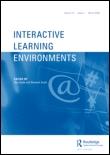
INTERACTIVE LEARNING ENVIRONMENTS
Unveiling the potential of technology in transformative learning experiences.INTERACTIVE LEARNING ENVIRONMENTS, published by Routledge Journals, Taylor & Francis Ltd, is a premier peer-reviewed journal that focuses on the intersection of technology and education, dedicated to advancing the understanding of interactive learning methodologies. With an impressive Q1 ranking in both Computer Science Applications and Education, as well as in E-learning, this journal stands out as an authoritative source of innovative research, ranking 28th in Education and 65th in Computer Science according to Scopus metrics. The journal's comprehensive scope covers a broad range of topics, from the effectiveness of haptic feedback in learning environments to the development of adaptive learning technologies, making it a vital resource for researchers, educators, and policy-makers alike. Although currently not an open-access publication, INTERACTIVE LEARNING ENVIRONMENTS provides readers with substantial insights and empirical findings critical for both theoretical and practical applications in the evolving landscape of educational technology.
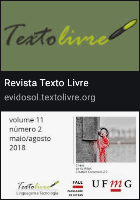
Texto Livre-Linguagem e Tecnologia
Unlocking the Potential of Language in a Digital World.Texto Livre-Linguagem e Tecnologia is a prominent academic journal published by the Federal University of Minas Gerais, Faculty of Letters, specializing in the interdisciplinary domains of language, technology, and communication. Since its establishment, the journal has embraced an Open Access model, fostering unrestricted dissemination of research findings. With an ISSN of 1983-3652, it aims to bridge theoretical insights and practical applications in linguistics and technology, thereby enriching scholarly dialogues worldwide. The journal's recent classifications in the 2023 Category Quartiles highlight its relevance, achieving Q3 in Communication, Q4 in Computer Science Applications, and Q2 in Linguistics and Language. Additionally, it has earned respectable Scopus rankings, placing it within the 71st percentile for Language and Linguistics in the Arts and Humanities. This positions Texto Livre as a vital resource for researchers, professionals, and students keen on exploring the dynamic interplay between language and technology. By engaging with cutting-edge research, contributors and readers alike can shape the future discourse in these critical fields.
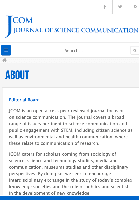
JCOM-Journal of Science Communication
Empowering Dialogue: Transforming Science CommunicationJCOM - Journal of Science Communication is a premier, peer-reviewed journal dedicated to enhancing the dialogue between science and society. Established in 2002 by the Scuola Internazionale Superiore di Studi Avanzati in Italy, it has become an essential platform for research in the field of science communication, reflecting the growing importance of effective communication in the advancement of scientific knowledge. The journal boasts an impressive Open Access model, encouraging widespread dissemination of critical research findings. With a notable impact in the Communication category, ranking in the Q2 quartile, and achieving a remarkable 77th percentile in Scopus ranks, JCOM positions itself as a crucial resource for scholars, professionals, and students alike. With a broad scope covering interdisciplinary aspects of science communication, the journal aims to foster innovative research and discussions that bridge the gap between scientific communities and the public. Located in Trieste, Italy, JCOM invites contributions that elevate the standards and practices of communicating science in an increasingly complex world.